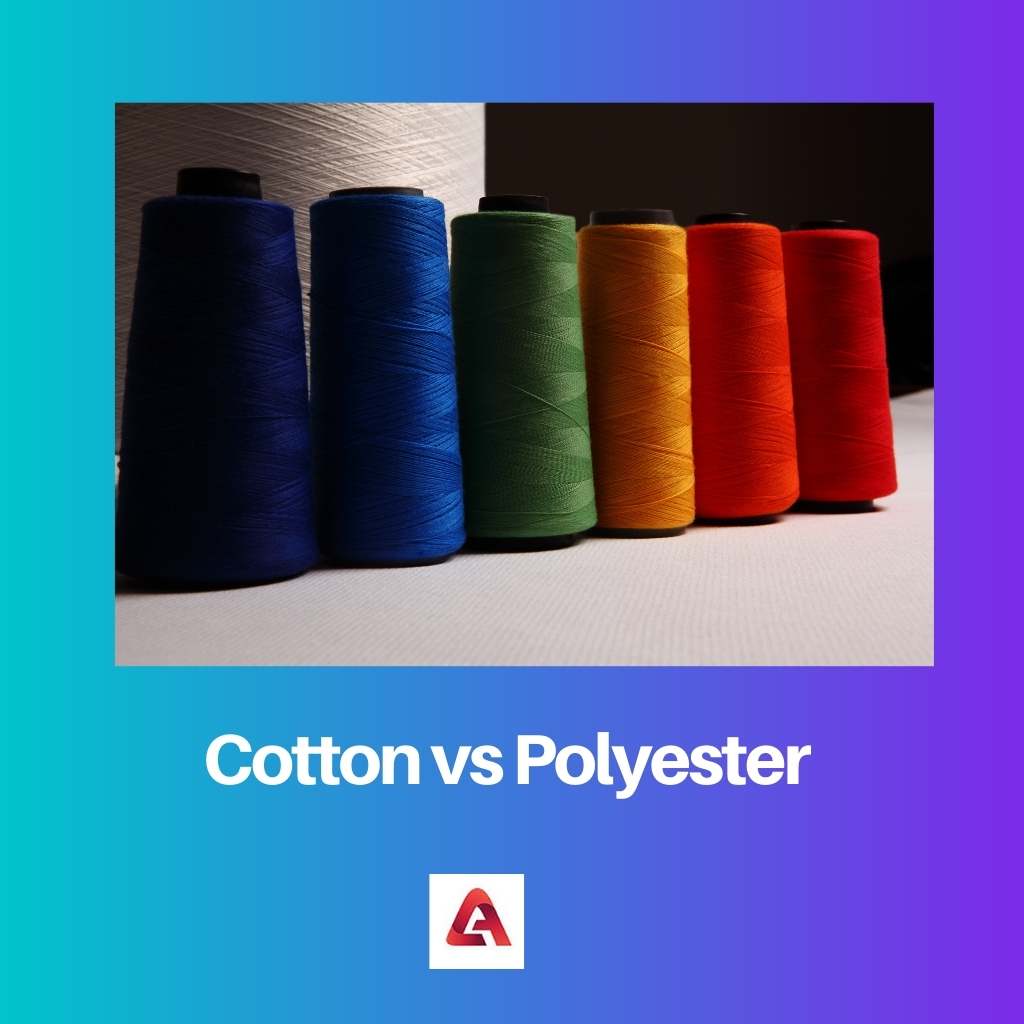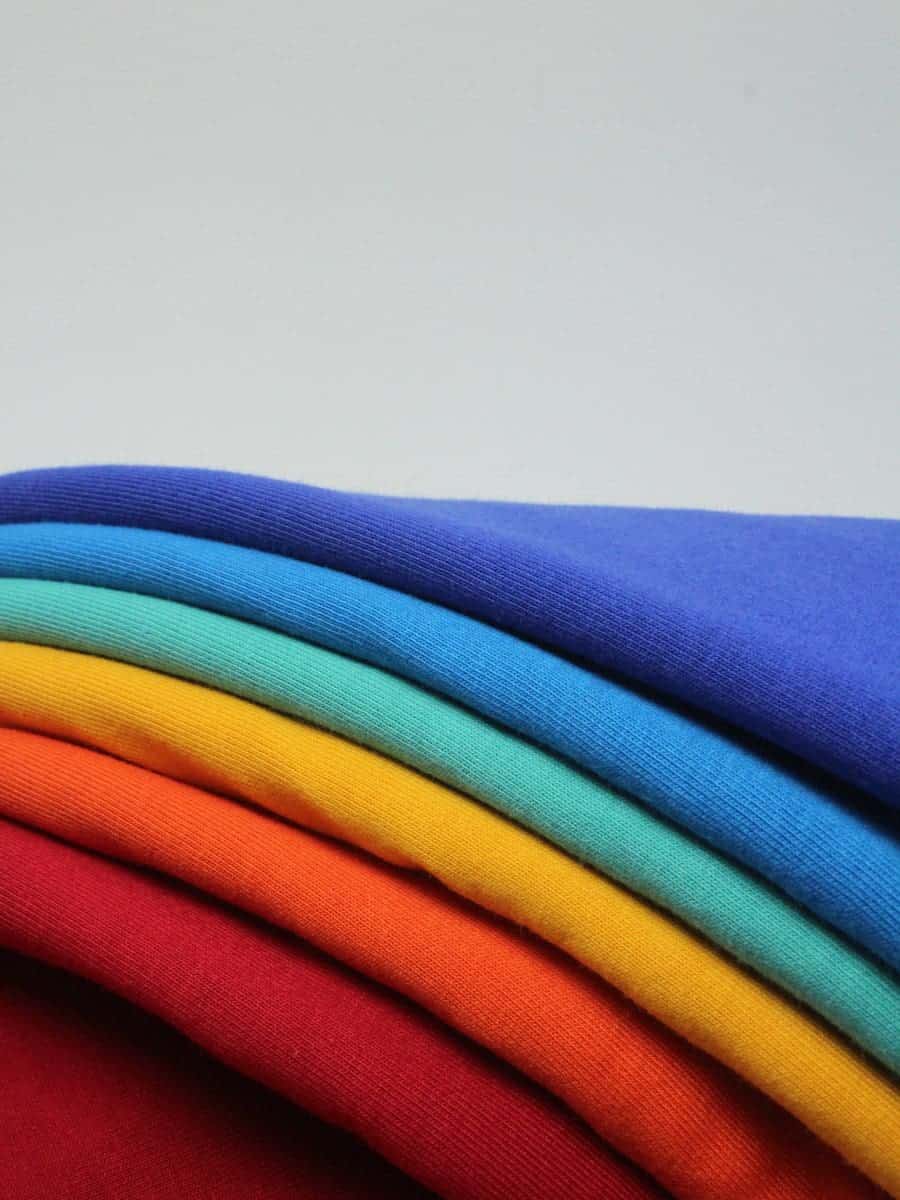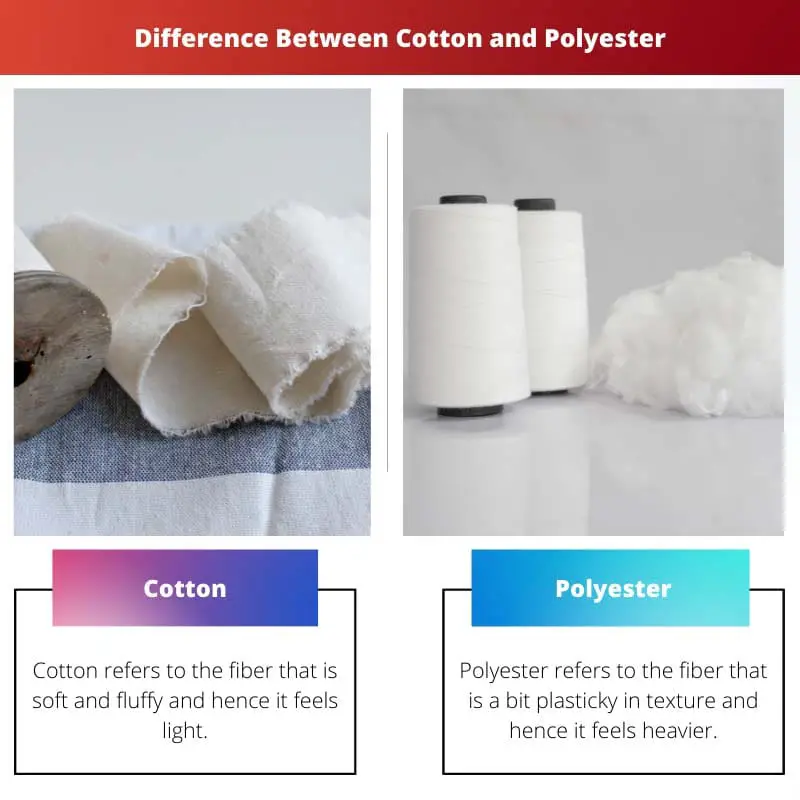As we know, Cotton and Polyester are two materials that are widely used to make clothes.
There are many differences between the materials, such as how they are generated, the techniques used to transform the raw materials into the finished materials, their usages, advantages, disadvantages, etc.
It depends from person to person or season to season as to which material cloth to be used.
Key Takeaways
- Cotton is a natural fiber derived from cotton plants, while polyester is a synthetic fiber from petroleum-based chemicals.
- Cotton is breathable, soft, and hypoallergenic, whereas polyester is durable, wrinkle-resistant, and dries quickly.
- Cotton tends to shrink and wrinkle easily, while polyester maintains its shape and size after washing.
Cotton vs Polyester
The difference between Cotton and Polyester is that there is the slightest difference in their origins. Cotton is considered to be a natural material as it is extracted directly from nature. On the other hand, Polyester is considered to be a man-made material as it is made by a man with the help of the technique of melting the PET Plastic Plates into the usable fabric for clothes.

Generally, cotton is a soft-white fluffy fibre that is annually grown and extracted from the cotton plant. It is referred to be a cellulose fibre.
Cotton requires a lot of care, such as a reasonable climate with an air temperature between 70° to 100°F (21-37°C) to bloom.
Cotton is considered to be a natural material as it is extracted directly from nature.
On the other hand, Polyester is a fibre that is a bit harsh and generates chemicals in the process of transforming into polyester yarns or fibres.
It does not require any specific season and hence can be manufactured any time of the year. It is referred to be a synthetic fibre.
Polyester is considered to be a man-made material as a man makes it with the help of the technique of melting PET Plastic Plates into the usable fabric for clothes.
Comparison Table
| Parameters of Comparison | Cotton | Polyester |
|---|---|---|
| Definition | Cotton refers to the fiber that is soft and fluffy and hence it feels light. | Polyester refers to the fiber that is a bit plasticky in texture and hence it feels heavier. |
| Fiber Type | Cotton is referred to be a cellulose fiber. | Polyester is referred to be a synthetic fiber. |
| Origin | Cotton is extracted naturally from cotton plants. | Polyester is termed to be man-made. |
| Price | Usually, 100% pure cotton is expensive and significant. | Polyester is comparatively cheaper than cotton. |
| Biodegradable | Cotton is a natural fiber and therefore it quickly gets dissolved. | Polyester is not a natural fiber and therefore it takes time to get dissolve. |
| Weight | Cotton clothes are heavier in terms of weight. | Polyester clothes are comparatively lighter in terms of weight. |
| Temperate | The cotton plant requires a reasonable temperature between 21-37°C to produce cotton. | Polyester requires a high temperature between 120-130°C to compress the PET plastic plates to produce polyester. |
| Preference | Cotton fibers or cloths are widely preferred during the hot summer season. | Polyester fibers or cloths are widely preferred during the cold winter season. |
| Sustenance | Cotton fiber cloths help the skin to breathe and sustain. | Polyester fiber cloths clog the skin and can not easily sustain. |
| Pros | The pros of cotton are that it is soft, comfortable, gentle, light, popular, etc. | The pros of polyester are that it is long-lasting, gives warmth in winter, is odor resistant, does not shrink, dries quickly, etc. |
| Cons | The cons of cotton are easily sprinkled, expensive, slow to dry, heavier, etc. | The cons of polyester are less breathable, hot during summer, not quickly biodegradable, etc. |
What is Cotton?
Generally, cotton is a white and soft ball-like structure like fibre that cotton plants produce annually. It is very delicate and soft in the initial stage.
With the help of cotton, one can manufacture beautiful cotton clothes from it. Cotton clothes are good quality clothes that are widely preferred in winter.
Cotton clothes are breathable yet give the slightest bit of warmth.
Cotton is referred to be a cellulose fibre. It is referred to as cellulose fibre as it is extracted directly from the cotton plants, and further, it is transformed in the form of threads that helps to manufacture clothes.
Usually, 100% pure cotton is expensive and significant. This is because it is annually fetched from the cotton plants, takes time to grow, and is expensive.
The plant requires a reasonable temperature between 21-37°C to produce cotton annually. Cotton is a natural fibre, and therefore it quickly gets dissolved. It is a biodegradable fibre that does not take time to dissolve.
The pros of cotton are that it is soft, comfortable, gentle, light, popular, etc. And on the other hand, the cons of cotton are that it is easily sprinkled, expensive, slow to dry, heavier, etc.
If someone wants to wear cotton clothes, they should remember this point and buy according to their convenience.

What is Polyester?
Polyester is a synthetic material that is used to make clothes. It is called synthetic because it is a man-made fibre that is used to make a wide variety of clothes.
The process of making polyester includes the technique of compressing the PET plastic plates into the final synthetic thread to manufacture clothes.
Polyester requires a high temperature between 120-130°C to compress the PET plastic plates to produce polyester. The texture of polyester clothes is a bit harsh and non-breathable. Polyester clothes are cheaper and are easily affordable for everyone.
Since we know that Polyester is not a natural fibre, it takes time to dissolve in nature. It can not directly be termed to be a biodegradable product, as it takes many decades to dissolve.
The clothes are also light in weight and can be easily carried. Also, polyester clothes are not breathable, giving us warmth.
Therefore, it is not always preferred during the summer as it makes us feel hotter and does not even absorb the sweat. It is only preferred during the winter.
There are many pros and cons of polyester or polyester clothes.
The pros of polyester are that it is long-lasting, gives warmth in winter, is odour resistant, does not shrink, dries quickly, etc. Whereas the cons of polyester are that it is less breathable, hot during summer, not quickly biodegradable, etc.

Main Differences Between Cotton and Polyester
- Cotton refers to the soft and fluffy fibre, and hence it feels light. On the other hand, Polyester refers to the fibre that is a bit plasticky in texture, and hence it feels heavier.
- Cotton is referred to be a cellulose fibre. On the other hand, Polyester is referred to be a synthetic fibre.
- Cotton is extracted naturally from cotton plants. On the other hand, Polyester is termed to be man-made.
- Usually, 100% pure cotton is expensive and significant. On the other hand, Polyester is comparatively cheaper than cotton.
- Cotton is a natural fibre, and therefore it quickly gets dissolved. On the other hand, Polyester is not a natural fibre; therefore, it takes time to dissolve.
- Cotton clothes are heavier in terms of weight. On the other hand, Polyester clothes are comparatively lighter in terms of weight.
- The cotton plant requires a reasonable temperature between 21-37°C to produce cotton. On the other hand, Polyester requires a high temperature between 120-130°C to compress the PET plastic plates to produce polyester.
- Cotton fibres or clothes are widely preferred during the hot summer season. On the other hand, Polyester fibres or cloths are widely preferred during the cold winter season.
- Cotton fibre cloths help the skin to breathe and sustain. On the other hand, Polyester fibre cloths clog the skin and can not easily sustain.
- The pros of cotton are that it is soft, comfortable, gentle, light, popular, etc. On the other hand, the pros of polyester are that it is long-lasting, gives warmth in winter, is odour resistant, does not shrink, dries quickly, etc.
- The cons of cotton are that it is easily sprinkled, expensive, slow to dry, heavier, etc. On the other hand, the cons of polyester are less breathable, hot during summer, not quickly biodegradable, etc.





